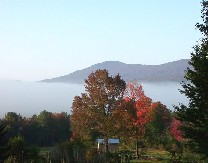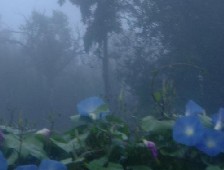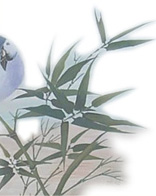|
 LISTEN TO THE TEXT LISTEN TO THE TEXT LISTEN TO SHIRLEY SANGE THE POEM LISTEN TO SHIRLEY SANGE THE POEM
 Hi, friends, today I would like to introduce a new Chinese classical poem Hua Fei Hua--A Flower In The Fog by Bai Juyi(772ØD846), one of the greatest poets in Tang Dynasty(A.D.618-A. D.907) and also one of the greatest Buddhists. About its meaning, there are many different opinions. Some people said that is a Buddhist”Æs chant or hymn. Some people said it is a poem to write the tryst of a man and a woman. I am not sure even though I could recite this poem when I was very young, I just feel it is very beautiful. So, here, I would like only tell you its surface meaning of the words and let you to make a judgment by yourself. Hi, friends, today I would like to introduce a new Chinese classical poem Hua Fei Hua--A Flower In The Fog by Bai Juyi(772ØD846), one of the greatest poets in Tang Dynasty(A.D.618-A. D.907) and also one of the greatest Buddhists. About its meaning, there are many different opinions. Some people said that is a Buddhist”Æs chant or hymn. Some people said it is a poem to write the tryst of a man and a woman. I am not sure even though I could recite this poem when I was very young, I just feel it is very beautiful. So, here, I would like only tell you its surface meaning of the words and let you to make a judgment by yourself.
This poem has been matched music by Huang ZiIt is a song for the Chinese students who are learning vocal music have to learn. I learned it in the early of 2003. I am going to try to sing it for you as well.
MAIN MEAMING OF THE POEM LISTEN TO SHIRLEY SANGE THE POEM: LISTEN TO SHIRLEY SANGE THE POEM:
ItӮs a flower, but itӮs not a real flower,
ItӮs a fog, but itӮs not a fog as well.
It comes at midnight and goes at dawn,
It comes as a spring dream and can not stay for awhile,
It goes as the morning clouds and can not look for anywhere.
( Note: Here is another translation by People's Education Publish House, give you for information as well:
A Flower In The Haze
In bloom, she's not a flower;
Hazy, she's not a haze.
She comes at midnight hour;
She goes with starry rays.
She comes like vernal dreams that cannot stay
And goes like morning clouds that melt away.
I did not translate something in the poem to be "she", I would like to give our readers bigger room to imagine. I do hope to hear your opinions about that as well...)
 CHINESE PRONUNCIATION CHINESE PRONUNCIATION LISTEN TO SHIRLEY SANGE THE POEM: LISTEN TO SHIRLEY SANGE THE POEM:
»Ø·Ē»Ø:Hua1 fei1 hua1,
Īķ·ĒĪķ:Wu4 fei1 wu4,
Ņ¹°ėĄ“:Ye4 ban4 lai2,
ĢģĆ÷Č„: Tian1 ming2 qu4”£
Ą“Čē“ŗĆĪ²»¶ąŹ±:Lai2 ru2 chun1 men4 bu4 duo1 shi2,
Č„ĖĘ³ÆŌĘĪŽĆŁ“¦:Qu4 si4 chao1 yun2 wu2 mi4 chu4”£
NEW WORDS:
»Ø·Ē»Ø: hua1 fei1 hua1 -- flower, it is not a flower
ȯ: hua1 -- flower
·Ē:bu2 sh4 -- not
Īķ·ĒĪķ:wu4 fei1 wu4 -- fog/hazy, it is not a fog/hazy
Īķ:wo4 -- fog, hazy
Ņ¹°ėĄ“:ye4 ban4 lai2 -- come in the midnight
Ņ¹°ė: ye4 ban4 -- in the midnight
Ą“: lai2 -- come
ĢģĆ÷Č„: tian1 ming2 qu4 -- go at the dawn/daybreak
ĢģĆ÷:tian1 ming2 -- dawn, daybreak
Č„: qu4 -- go
Ą“Čē“ŗĆĪ²»¶ąŹ±:(it) comes as a spring dream and can not stay for a long time
Čē: ru2 --like, as
“ŗĆĪ: spring dream, vernal dream
¶ąŹ±: duo1 shi2 -- a long time
Č„ĖĘ³ÆŌĘĪŽĆŁ“¦:qu4 si4 chao1 yun2 wu2 mi4 chu4 -- When (it) goes, just like a morning clouds, can not be look for everywhere/melt away
ĖĘ:si4 -- prep. like
³ÆŌĘ:zhao1 yun2 -- morning clouds
ĪŽ: wu2 -- no
ĆŁ:mi4 -- look for
“¦: place
CHINESE CHARACTERS> LISTEN TO SHIRLEY SANGE THE POEM: LISTEN TO SHIRLEY SANGE THE POEM:
»Ø·Ē»Ø,
Īķ·ĒĪķ,
Ņ¹°ėĄ“,
ĢģĆ÷Č„”£
Ą“Čē“ŗĆĪ¼ø¶ąŹ±£¬
Č„ĖĘ³ÆŌĘĪŽĆŁ“¦”£
 Ok, how do you think of this poem? Do you like it? What is its meaning in your opinion? Ok, how do you think of this poem? Do you like it? What is its meaning in your opinion?
If you have any questions, comments and suggestions, please write to shirley@ebridge.cn, you are welcomed.
--Shirley
Written on Thur., Oct 20, 2005
Edited and Recorded On Oct 22, 2005
|

